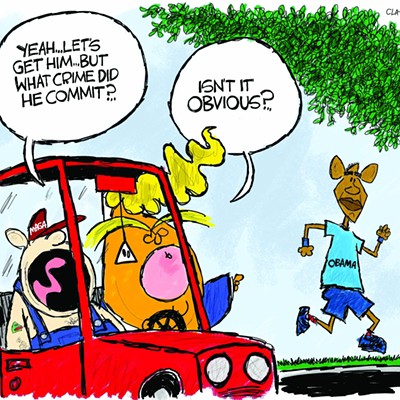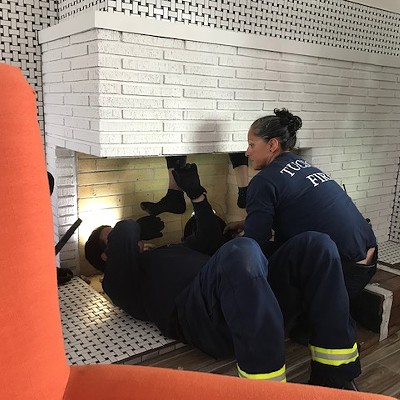He's also seen the educated tripped up by thinking clouded by rage.
And he and his colleagues have seen plenty of just dumb.
"It's the old Darwin thing," Unklesbay says. "You look at them in court, and you wonder how they get through each day."
This week, the Weekly is "honoring" some of these dopes who have somehow escaped survival of the fittest. We came across these stories through word-of-mouth and conversations with those involved in the justice process; we then verified all the facts.
This Hall of Shame comes with compliments to the cops who busted the nominees, the lawyers who prosecuted them, and some of the lawyers who were handed the tall task of defending them. The tales are timeless--there's no shortage of equally stupid criminals in Tucson today.
We're on a first-name basis with honorees in a final attempt to protect the guilty.
Doughnut dolt
If you want to find all the cops, they're hanging out in the doughnut shop.It's more than a cliché or a line from an '80s Bangles song.
Ralph had just robbed a downtown business. It went so smoothly that it seemed routine, and no internal warning went off when he passed by a doughnut shop. Caving to munchies, a caffeine craving or simple loneliness, Ralph walked in.
Several of Tucson's finest, including a captain, were having coffee. It took them only moments to recognize Ralph from the description that had been repeatedly squawking from their radios.
Ralph was promptly arrested.
Bad Santa
Tom was feeling festive for the holidays and decorated his home in anticipation of a parade of sightseers.He took to the roof himself to play Santa. From near the chimney, he smiled and waved and wished everyone a Merry Christmas.
But something was missing. Tom had the white hair, Santa hat, Santa coat, Santa gloves, and Santa boots, but no pants and a big erection.
Police had no trouble with identification.
Where else do you keep your needles?
Tucson defense lawyer Jeff Rogers has a dual perspective on the law and those who break it. He was a sheriff's deputy before becoming a lawyer. He recalls Tad, a dope fiend and fidgety guy who pulled into a Jack in the Box on East Broadway Boulevard one day. He ordered with little trouble, paid and took his Jumbo Jack to go. Jonesing for the burger or for the high, Tad punched his Camaro a little too hard. A traffic cop pulled him over and noticed Tad's needle tucked behind his ear. The inventory to go with the paraphernalia was equally evident.
Troublesome butt
Trey was happy. He was about to score some major cash for simply driving a truck packed with pot from the Tucson distribution hub to a Midwest city.Trey had it licked--it was an easy cruise. No stops and problems. Well, at least until he smoked a cigarette and tossed the butt out the window. The draft blew it into the load, and it landed just right.
Trey didn't notice the smoke and fire until a state trooper saw a burning truck going down the interstate, pulled it over and pointed out the problem to him.
Trey is now in the federal prison in Tucson.
Mr. Personality
Danny was a local career criminal who had pulled--and botched--enough jobs to be prosecuted separately by Rick Unklesbay and two of his colleagues in the Pima County Attorney's Office.For the current charge against Danny, prosecutors wanted to show prior convictions. A prior conviction cannot be demonstrated simply by recitation in court or the showing a piece of paper; it has to be part of the evidence of a case. One way to accomplish that is to have the prosecutor who handled the previous case testify in court that he or she had, in fact, previously prosecuted the defendant. Identification is necessary.
In this case, Unklesbay was called on to identify the defendant, and sufficient time had passed for Unklesbay to wonder if he would still remember Danny.
As he and his colleague, Tom Rankin, walked the block from their offices to the Superior Court Building, Unklesbay had some doubt if he would be able to identify the thief.
There are four elevators in the courthouse; the doors opened on one, and the two lawyers walked in.
"Hi, Mr. Unklesbay," said Danny. "Remember me?"
And Danny went back to prison.
There are others who point fingers--at themselves
Reuben Emanuel grew up in Philadelphia, where he saw "made" men and their associates ply their trade. He rose above, studying economics at Temple University before graduating from the University of Arizona College of Law.A former Tucson magistrate, Emanuel remembers the case of "Shoe Shine," who did his work in a Congress Street barbershop.
The barber would arrive each day and open both doors, front and back, the latter of which led to the alley. It was a calmer era--customers and talkers would use that back door regularly. The barber also had a safe, which he regularly left open.
In the safe was little, except a ring. One day, it was gone. After a "thorough" investigation, the police arrested Shoe Shine, who greatly protested his innocence.
He was not alone in having access to the safe through the back door. Everyone came and went from the barbershop--a popular gathering spot--and it could have been anyone.
This is exactly what the defense raised during the trial. Shoe Shine nervously rose to his feet to hear the verdict.
"Not guilty." There was reasonable doubt that such a trusted man could have turned on the shop owner and stolen the jewelry.
"You are," the judge told Shoe Shine, "free to go."
The judge had one foot out of the court doorway, on his way back to his chambers, when a slightly bewildered Shoe Shine asked, "Does that mean I gets to keep the ring?"
Double jeopardy precluded re-trial. But it did not prevent a subsequent civil trial to re-claim the ring.
Call wardrobe
There are things the defense bar would not argue about with prosecutor Unklesbay. Bank cameras are one such thing."They are notoriously bad," Unklesbay says. They're fuzzy and, and they distort--on a good day.
Another area of agreement is that defense lawyers, even those in the public defenders' offices, want to polish up their clients with a change of clothes, shave and haircut, for court appearances.
At first, it seemed that Richard--who had robbed a downtown bank--was lucky: The photographs of him were awful.
In court, however, a teller was able to give a detailed description. Height, build, hair, face, complexion, clothes.
The defense quickly rose to challenge her description. How could you be certain, she was asked. "He doesn't look exactly like that in these pictures," said the defense. "How can you be so sure?"
Because, she answered, "He's wearing the same clothes he wore when he robbed us."
Untouchable
Before James Nesci rose to DUI defense supreme stardom--representing Diana Ross and many who don't stay at Canyon Ranch--he trained at Unklesbay's shop.He was given the opportunity to handle a traffic case 10 years ago that he remembers with little prodding.
Jack was in a hurry, and not the least daunted by a Pima County sheriff's deputy who was awaiting a green light on Stone Avenue at Grant Road. Jack stepped on it and pulled right around the deputy and the other cars, made his turn and sped away.
The deputy pursued, pulled Jack over and wrote him up for his multiple violations.
Jack was unfazed. He challenged the tickets and was confident his ace in hole would sink the deputy.
"Yes, your honor, I pulled around the deputy and the other drivers, cut in front of them and drove off. So what? I was at Stone and Grant in the city!"
The judge let it play out.
Nesci asked Jack not about the fancy statutes that give cops in Arizona authority to make stops essentially anywhere, but simply what city he was in.
Tucson.
And Tucson is a city wholly contained within what county?
Pima. Wait, Pima County. Can he do that?
Yes.
And, by the way, you're guilty.
I'll need the receipt for a tax deduction
Some smart people do stupid things not just in white-collar tricks, but in brutal and bloody crimes.Dale was a successful anesthesiologist in Phoenix making more than $400,000 a year. He and his wife had been married for 19 years when they divorced. She moved to a home in a rural setting on Tucson's northwest edge.
The doctor could not--or would not--realize just how easy he got off in the divorce. He was paying his ex-wife just $34,800 a year. Spouses with that type of income, according to records and divorce lawyers, usually have to pay out double or triple that.
But the doctor was particularly incensed that his wife, in the fourth year of the divorce, was seeking to boost her monthly payment from $2,900 to $3,900 (still a bargain). Any amount infuriated the doctor, whose financial stratagems included bankruptcy.
He paid through the court clearinghouse for alimony and support payments. He was not, given the bad blood, supposed to have his wife's address. But he got it in a slip-up in court papers.
Dale rented a car--a blue Ford Escort--and drove to Tucson to scope her house and neighborhood. Several of her neighbors reported seeing him, but he denied it, and said his surgery schedule would have made the trips impossible.
When Dale returned to kill his ex-wife, neighbors also heard her screams--and they were recorded on a 911 call--made after she was shot, through a window, in the jaw. She then was bludgeoned so badly that her brain was exposed through her shattered skull.
The key link was the rental car. Dale had rented it in his own name with one of his credit cards. And he kept the receipt, which investigators had no trouble finding in his house.
Dale, now 74, is in his 10th year of a 25-year sentence in prison, spared the death penalty only because Judge Michael J. Brown, now retired, turned soft when Dale's brother dropped dead in the courthouse as he arrived for a sentencing hearing.
Brown reasoned there had been enough death from the case.
Signing party
Donning a black robe, even in the lesser venue of Justice Court, was a dream for Armando two years ago.After a career in the University of Arizona bureaucracy, Armando decided to take a stab at judicial politics. He joined with the Republican Party at age 53 in 2001 and sought to become Justice of the Peace in a foothills precinct, where he and his wife live in a $410,000 home.
Justice Court is the last, fading bastion of layman's law. You needn't be a lawyer to be a justice of the peace. But it pays well and makes for a boosted retirement.
How Armando reached the point where he thought he could be a Justice of the Peace contender, no one knows. It's a business where dues--party membership, volunteer work, door-knocking, sign-posting, fund-raising for others--are expected.
Armando and his wife were unencumbered by such protocol. For the nominating petitions--only 680 signatures were needed for a place on the Republican primary ballot--Armando and his wife skipped the normal practice of walking the precinct, working events or hanging out in neighborhood supermarkets.
Instead, they sat in their home and partied--the sloppiest petition signing party in memory. They crudely filled out petitions, alternating style and ink. But they stupidly included the names of those who had previously signed for the other, and real, candidate. They forgot all about Judge Roy Bean and included the signature of a voter from Texas.
The real fun came when Armando and wife tried to raise the dead: They included the names of three voters, each in the grave well before signing day.
For all that, they got hauled into Superior Court, only because their opponent was a lawyer and a doctor and a stickler for details. Armando did what many people would like politicians to do: He became a hermit. A mole. He never emerged from his darkened chamber in the foothills. He ducked process service and skipped his court date.
It took Judge Paul Tang, the bright former legal adviser to the Pima County Republican Party, just minutes to kick Armando off the ballot. Armando also earned a felony fraud conviction and a hefty fine.
The conviction is a favor to voters. Felons can't vote.
Body double
The jokes about Raul Grijalva impersonating a congressman were inevitable when the Tucson Unified School District and Pima County pol vaulted convincingly over long line of challengers to take a place in Washington, D.C., that was once held with distinction by Mo Udall.But it was Art who was busy impersonating Grijalva. Police arrested Art just three days before last month's Grijalva re-election campaign "pachanga" at El Casino Ballroom.
Art has had to change his schtick. He started playing Raul four years ago, when the latter was still on the Board of Supervisors. Authorities say Art's game was to call trusting souls (he had particular success with one victim) to say he was their loveable pol and that he needed cash to help friends, including the ill. Art had little trouble leaning on this victim, for a reported $300,000, with threats that the victim's mother could lose her home or that his brother would lose his government job.
Hey, sounded good. Raul frequently called people--including political opponents with fat wallets--for help with legitimate social- service and church causes on the southside.
Art also knew where to hang. Police arrested him in a southside bar in early March.
Damn, it feels good to be a (considerate) gangsta
It is the standup criminal who deserves a nod.A bow for Randy.
Randy jacked a car--not a funny thing--at gunpoint. The selection was thin or timing was bad, because Randy chose a dude driving a bucket of bolts. After some barking, Randy then chose to hop in and leave the driving to his victim.
"Got anything good? Anything worth something?"
"Not really," the terrified victim answered. "I did put a good stereo in."
"OK," Randy snapped. "I'll take it."
The man pleaded to keep the car, telling Randy he needed it for his livelihood. He asked if Randy could just take the stereo.
"OK, man," Randy said. "I'll drop you off here, take the car to my place, take out the stereo and then bring the car back. But don't you leave here."
Sure.
Randy drove the car to his place. He stripped the stereo and drove back to where he'd left his victim, who called 911.
The police were in the welcoming party.
Dumb criminals here take heart.
There's always Damon Stoudamire.










